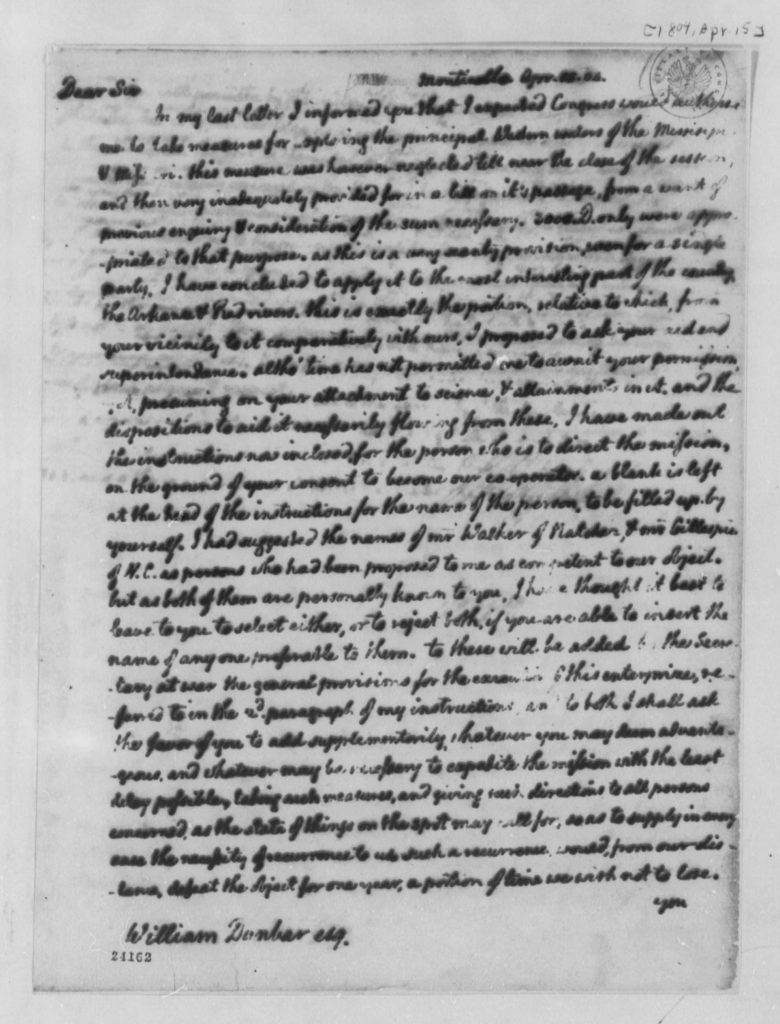Thomas Jefferson to William Dunbar, April 15, 1804

Letter from Thomas Jefferson to William Dunbar asking him to supervise the exploration of the Arkansas and Red Rivers, April 15, 1804.
Excerpts
Monticello Apr. 15. 04.
Dear Sir,
In my last letter I informed you that I expected Congress would authorize me to take measures for exploring the principal Western waters of the Mississippi & Missouri. This measure was however neglected till near the close of the season, and then very inadequately provided for in a bill on its passage, from a want of previous enquiry & consideration of the sum necessary. 2000 D. only were appropriated to that purpose. As this is a very scanty provision, even for a single party, I have concluded to apply it to the most interesting part of the country, the Arkansa & Red rivers. This is exactly the portion, relative to which, from your vicinity to it comparatively with ours, I proposed to ask your aid and superintendence. Altho’ time has not permitted me to await your permission, yet, presuming on your attachment to science, & attainment in it, and the dispositions to aid it necessarily flowing from these. I have made out the instructions now enclosed, for the person who is to direct the mission, on the ground of your consent to become our cooperator. A blank is left at the head of the instructions for the name of the person, to be filled up by yourself. I had suggested the names of Mr. Walker of Natchez, & Mr. Gillespie of N.C. as persons who had been proposed to me as competent to our object. But as both of them are personally known to you, I have thought it best to leave to you to select either, or to reject both, if you are able to insert the name of any one preferable to them.
To these will be added by the Secretary at War the general provisions for the execution of this enterprise, referred to in the 2nd paragraph of my instructions, and to both I shall ask the favor of you to add supplementarily, whatever you may deem advantageous, and whatever may be necessary to expedite the mission with the least delay possible, taking such measures, and giving such directions to all persons concerned, as the state of things on the spot may call for, so as to supply in every case the necessity of recurrence to us. Such a recurrence would, from our distance, defeat the object for one year, a portion of time we wish not to lose. You perceive by the instructions that a Doctor George Hunter of Philadelphia is appointed to go as a coadjutor & successor in case of accident to the principal. His forte is chemistry. In the practical part of that branch of science he has probably no equal in the U.S. and he is understood to be qualified to take the necessary astronomical observations. The thing to be guarded against is that an indulgence to his principal qualification may not lead to a hazarding of our mission to search for gold and silver mines. These are but an incidental object, to be noted if found in their way, as salt, or coal, or lime would but not to be sought after. Referring therefore what now remains to be done to your kind assistance, I tender you my friendly salutations & assurances of great esteem & respect. Th: Jefferson
Questions:
What did President Jefferson ask William Dunbar to do?
According to the letter, who paid for this expedition?
Who was appointed to go along with William Dunbar? What was his area of specialty?
What other natural resources is Jefferson interested in? Why might he be interested in those resources?